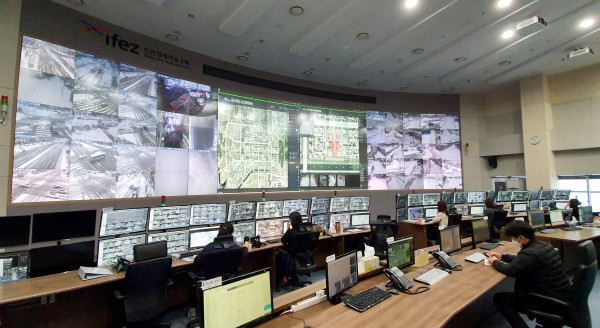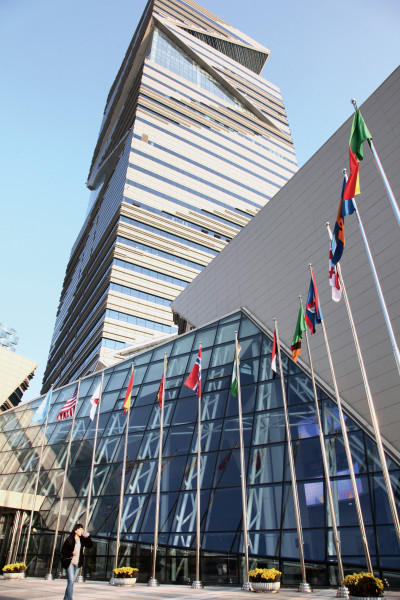Incheon to promote 40 projects, including urban innovation, corporate development, and citizen engagement initiatives
IFEZ services powered by artificial intelligence (AI), autonomous driving, and big data are all expected to take a step forward in its journey towards becoming a smart city by 2030. Also, the services of innovative SMEs and startups will be tested by Incheon’s local residents to help solve various urban problems together.
The Incheon Free Economic Zone Authority hosted a briefing session for the “Incheon Free Economic Zone (IFEZ) Smart City Promotion Strategy - Final Report” on December 23 at the G Tower in Songdo International City. The event was attended by special guests and various other stakeholders, including Lee Won-jae, the Commissioner of the IFEZ Authority.

▲ IFEZ services powered by artificial intelligence (AI), autonomous driving, and big data are all expected to take a step forward in its journey towards becoming a smart city by 2030. Photo from the Smart City Operation Center at Songdo G Tower.
At the briefing session, participants discussed the future strategy and tasks for the IFEZ smart city to accomplish by 2030.
The IFEZ Authority also reviewed IFEZ’s current progress as s smart city, which had been promoted as part of Incheon’s new urban development strategy using information and communication technology (ICT) since 2003, and established a promotion strategy to expand IFEZ’s role as a foundation for new growth engines for the future (e.g. sustainable urban development, improvement of the quality of life for citizens, and business development) by introducing latest technologies such as autonomous driving, big data, and artificial intelligence to IFEZ by 2030.
Strategies for this project will be divided into 40 projects across four areas: ① Urban innovation, ② Business development, ③ Citizen engagement, and ④ Data dam development.
First, in regard to urban innovation, intelligent CCTV control that tracks objects using AI technology will be introduced to reduce the burden on control personnel and eliminate blind spots, which, in turn, can make the city safer. In addition, IFEZ will use drones to monitor air pollution, traffic, and facilities for abnormalities, and use small caterpillar robots to move around in underground spaces and check for harmful gases, odors, damage to pipelines, and fire hazards.
Moreover, using various Internet of Things (IoT) devices and AI technology, IFEZ will develop a safe and convenient transportation environment for pedestrians, and host level-4 or higher autonomous driving pilot projects in connection with national-level research projects. Incheon will turn Songdo Central Park and other parks across IFEZ into “smart parks,” build smart childcare centers, and add services that directly impact the lives of socially disadvantaged people by improving air quality, and expanding eco-friendly vehicle recharging infrastructure facilities.
To develop businesses, Incheon plans to solve urban problems using innovative ideas and technologies from private companies. Furthermore, the city will establish a “collaborative” so that SMEs and venture companies that are having difficulties in developing new markets can participate in smart city-related businesses, and also create an industrial ecosystem that suits the characteristics of IFEZ as a smart city.
To this end, using the Incheon Startup Park, Incheon will establish a cooperative system for demonstration support, expand startup demonstration programs, build a Smart City Playground where companies can freely test innovative services, create an environment where citizens can directly work with innovative companies in Incheon, and promote crowdfunding opportunities for promising companies.
In regard to public engagement, Incheon is creating an integrated online “IFEZ Living Lab Platform” designed to collect public feedback on newly proposed ideas and the commercialization of projects. Incheon is also planning to open a Living Lab aimed at identifying demands from local residents, where citizens can plan and develop smart city services directly, and another Living Lab tasked with solving urban problems in collaboration with experts in relevant fields.
Lastly, Incheon plans to build a data dam to collect data from about 7,000 sensors currently installed across IFEZ. Using this data dam, the city government will establish policies optimized to meet the needs of citizens by linking corporate demonstration and data collected from Living Labs, and by analyzing/converging data secured via these sources. Incheon is expected to revitalize the big data industry ecosystem and maximize the value of big data by allowing it to be jointly used in convergence with big data from private sources in the future.

▲ Aerial view of Songdo G Tower, home to the Incheon Free Economic Zone Authority.
According to the IFEZ Authority, IFEZ has accumulated significant know-how in terms of communication network infrastructure and platforms, smart city infrastructure, and public services thanks to its experience in Songdo, Yeongjong, and Cheongna International Cities. Leveraging its experience, the IFEZ Authority has managed to distribute and export its smart city platform to various cities both in Korea and abroad.
However, to address the lack of immersive services and programs that directly engage the public, and the absence of policies designed to nurture local businesses, Incheon aims to build a new IFEZ smart city by initiating a new smart city strategy that utilizes the world’s best smart city technology and infrastructure available at IFEZ, supports demonstrations by startups and small and medium-sized enterprises (SMEs), and utilizes Living Labs, where citizens directly participate in solving urban problems.